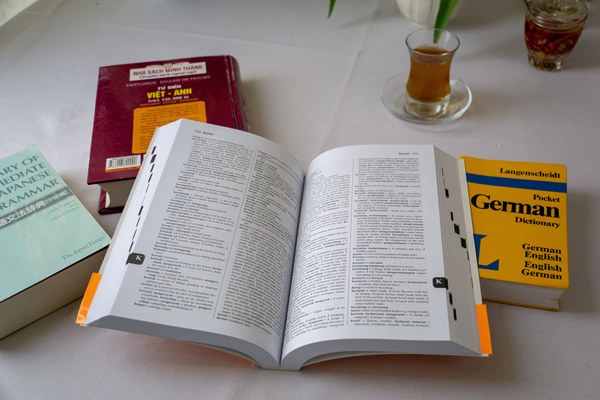Babel comes from the Hebrew verb meaning “to confuse,” and the story of Babel is the story of human folly in aiming to reach the heavens by building a large tower. To stop their efforts, God splintered their tongue into a dizzying multitude–and created the first language barrier humanity has experienced. Yet, one can find this diversity incredible, rather than regrettable. The 6,000 or so human languages that exist today are so rich that learning them, or learning about them, is a fascinating pursuit.

I’ve shared some of my tips on learning languages in three different articles, How I Learn Languages, How I Learn Languages: Where to Start, and How to Learn A Language by Reading and Listening, but today I would like to invite you to read about languages. I’ve selected five books that either explore the way languages developed or the way people use them. None of them are standard academic books, but rather works written by people passionate about words, sounds and letters.
John McWhorter, The Power of Babel: A Natural History of Language
If you enjoy languages, start by reading this book to appreciate the complexity and wonder of human tongues. The Power of Babel contains numerous examples and explanations, and it will surely inspire you to read further on the topic–or to learn a new language. Silbo Gomero, anyone?
Kató Lomb, Polyglot: How I Learn Languages
Gaston Dorren, Lingo: Around Europe in Sixty Languages
A book for a nerdy language lover, it’s nevertheless witty and erudite enough to engage anyone curious about the way we speak. Dorren surveys about fifty European languages and dialects and explains their quirks. Why do the Spanish speak so rapidly? How come Russians can understand each other across the breadth of that large nation, while people in tiny Slovenia would have difficulty following their neighbors when they speak a local dialect? What European language belongs to the Iranian family?
Nicholas Ostler, Empires of the Word: A Language History of the World
A language is a dialect with an army, they say. Empires of the Word explains how languages and dialects have evolved through conquests, battles, collaborations and the exchange of ideas. Unlike most other books on this list, Ostler explains, for instance, how Chinese maintained its form throughout its long history and why some lingua franca disappeared leaving few traces.
Michael Erard, Babel No More: The Search for the World’s Most Extraordinary Language Learners
A travelogue and a language research resource, this book is an exploration not of the languages we speak, but of the people who learn them–and learn them in mind-staggering quantities. Erard starts his journey searching for Giuseppe Caspar Mezzofanti, a 19th century Italian cardinal, or rather for his method of learning languages. Mezzofanti was a hyperpolyglot who spoke at least thirty languages “with rare excellence” and had basic knowledge in dozens of others according to his contemporaries.
Vladimir Nabokov, Lolita
This is an example of a masterful use of language. I could name several novels by this author who could play with words like few others. Ada, or Ardor would be a great example, so would Speak, Memory. The reason I choose Lolita, his most famous and most controversial novel, is because he uses language in a particularly masterful and devious way to speak about the forbidden. Every word choice is deliberate, every sentence is vivid.
Please recommend more books about languages, linguistics, and especially books about non-European languages.
Photography by Bois de Jasmin













17 Comments
Joan Rosasco: I loved reading this, dear Victoria — several new books to search out — while I sit here waiting for the truck that will remove 13 cartons of books that I must sadly sacrifice to regain some floor space! Books are an eternal temptation. December 16, 2019 at 10:18am
Victoria: Ah, the eternal struggle to regain floor space. I know what you mean! December 21, 2019 at 8:38pm
JoDee: I never once considered reading a book by a polyglot to learn methods for language acquisition. What a wonderful idea! I will put Kató Lomb’s book on top of my reading list now. I can’t wait to learn from her and see how it improves my Spanish and French! December 16, 2019 at 12:56pm
Karen A: Very fun! Thanks to your posts I found Italki, and now I’ve got two of the books listed above ordered. Looking forward to reading the Kató Lomb book for some tips to improve my language learning! Thanks!! December 16, 2019 at 6:03pm
Victoria: Isn’t Italki great? You can also use it to do a language exchange, although I find their regular tutors to be more reliable (given Italki’s strict rules on cancellation or not showing up). December 21, 2019 at 8:42pm
Karen A: It has been a game (language learning!) changer for me! December 22, 2019 at 1:54pm
Victoria: From all that I’ve read, Lomb’s book was the most practical. Maybe because it fits with my own method of learning languages, which is focused on speaking and interacting as well as reading. December 21, 2019 at 8:40pm
Toni: Thank you so much for writing about languages and sharing your book to tiles. I have been fond of languages since I was a small child and have always said that if I could have one “super power” it would be to speak any language that I heard so I could communicate with anyone. I am looking forward to reading these books. Thank you and happy holidays. December 16, 2019 at 3:21pm
Victoria: That’s a really cool super power. What a precocious child you were. December 21, 2019 at 8:43pm
Sandra: Thank you so much for these book recommendations V!
I have been trying to study Italian, and so far it has been going really well thanks to your tips and insight.
If anyone has any books to recommend for Italian I am all ears..
Happy Holidays to you and yours. Ciao Bella! December 17, 2019 at 8:49am
Victoria: Ciao Sara! Buon Natale a tutti voi.
I have a book at home called La Bella Lingua about one woman’s quest to learn Italian. I read only a part of it and it seemed interesting, so maybe it’s something to look into. December 21, 2019 at 8:46pm
Sandra: Ciao cara-
I just looked up that book, and the author I actually saw about a month ago at the Italian Cultural Institute here in NYC..she was talking about La Passione (How Italy seduced the world). I didn’t read that book, or La Bella Lingua, and now I will put the ladder one on my list. Grazie & Buon Natale December 22, 2019 at 7:58am
OnWingsofSaffron: Wonderful! I’ve downloaded two books, and am currently devouring Gaston Dorren’s, “Lingo”, a thoroughly enjoyable read, and am looking forward to “Empires of the Word” by Nicholas Ostler.
Thanks, Victoria, for the tips! December 19, 2019 at 4:16pm
Victoria: Lingo is an easy read, lighthearted, but it’s packed with fascinating info. I liked that he also covered some of the more unusual European languages. December 21, 2019 at 8:48pm
Aurora: Of those I have read Speak, Memory which I enjoyed very much. He is a master and to think that English wasn’t his mother tongue, the same applies to Conrad. December 20, 2019 at 10:48am
Victoria: Yes, it’s incredible! His Russian language novels are equally beautiful. December 21, 2019 at 8:48pm
rainboweyes: Not strictly about learning languages but also highly interesting: “19 Ways of Looking at Wang Wei” – about the art of translation… December 25, 2019 at 10:31am